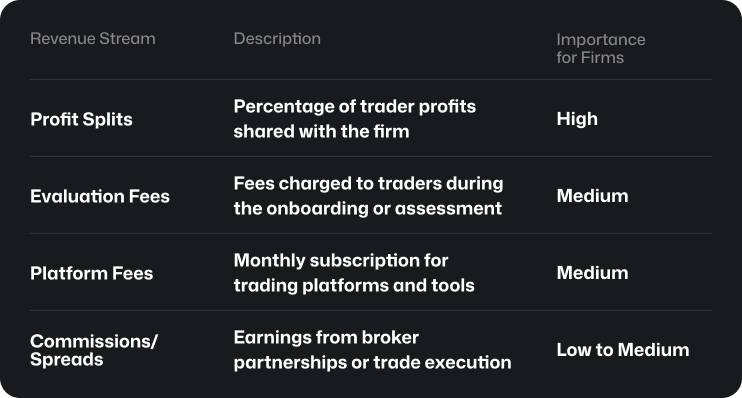How Do Prop Firms Make Money? A Deep Dive into Their Revenue Models

Proprietary trading firms, commonly known as prop firms, have gained immense popularity in recent years. They fund skilled traders who trade on their behalf, splitting profits between the firm and the trader. But how do prop firms make money, and what are the key elements behind their profitability? In this article, we’ll explore the ins and outs of prop firm revenue models and answer common questions about how these firms operate.
How Do Prop Firms Make Money?

How Do Prop Firms Stay Profitable?
To remain profitable, prop firms rely on a balanced approach that combines trader performance with consistent income from other streams. Let’s break down some of the key strategies:
- Risk Management
Strict risk controls ensure traders don’t blow large sums of capital. Prop firms often impose rules such as daily loss limits, maximum drawdown limits, and position sizing strategies to minimize risk. - Diverse Traders
Prop firms often work with traders of varying experience levels, allowing them to capture profits from high-performing traders while mitigating risk with evaluations for newcomers. - Automation and Technology
Many prop firms use algorithmic trading or automated systems to complement human traders, further diversifying their profit sources.
Frequently Asked Questions (FAQ)
1. How do prop firms make money if traders lose?
Prop firms have robust risk management systems in place to limit losses. They often cap the maximum amount a trader can lose, protecting their capital. Additionally, fees from trader evaluations and platform subscriptions generate revenue regardless of trading performance.
2. Do prop firms make money from beginner traders?
Yes, many prop firms make money from beginner traders through evaluation fees and platform subscriptions. Even if the trader doesn’t progress to live trading, the firm can still profit from these upfront charges.
3. What’s the typical profit split in a prop firm?
The profit split in a prop firm can vary, but it typically ranges between 70% for the trader and 30% for the firm. However, some firms may offer different splits based on the trader's experience and performance.
Glossary
- Prop Firm: A company that provides capital to traders in exchange for a percentage of the profits they generate.
- Profit Split: The agreed division of profits between the prop firm and the trader.
- Evaluation Fee: A fee charged to traders as part of the assessment process before they receive firm capital to trade.
- Spread: The difference between the bid and ask price of a trading instrument, often a source of revenue for brokers and firms.
- Risk Management: The practice of limiting potential losses by imposing controls on trading activities.
Conclusion: A Dynamic Profit Model
So, how do prop firms make money? Through a combination of profit sharing, fees, and partnerships, prop firms have multiple income streams that contribute to their bottom line. While the success of their traders plays a significant role, prop firms have diversified their revenue sources to ensure stability, even in unpredictable markets.
Whether you’re a trader considering joining a prop firm or someone looking to start one, understanding how prop firms make money is key to navigating this fast-paced industry.
External Links: How Do Prop Firms Make Money? A Deep Dive into Their Revenue Models
Here are some more resources for you:
Top External Webpages:
- https://proprietaryfirms.com/how-do-prop-firms-make-money/
- https://www.dailyforex.com/forex-articles/how-do-prop-firms-make-money/214102
- https://propfirmreviews.net/blog/how-do-prop-firms-make-money/



